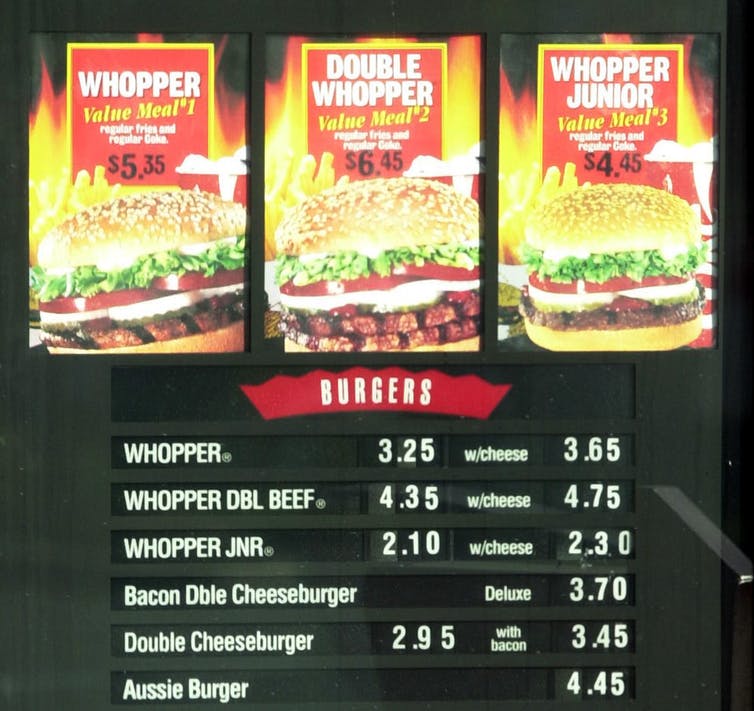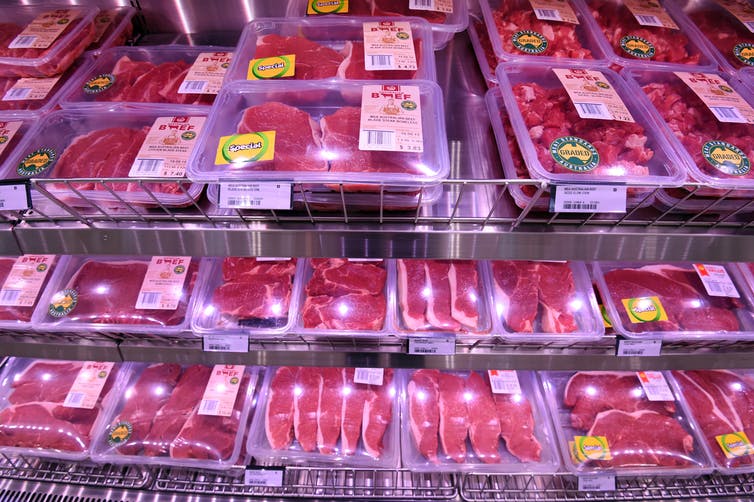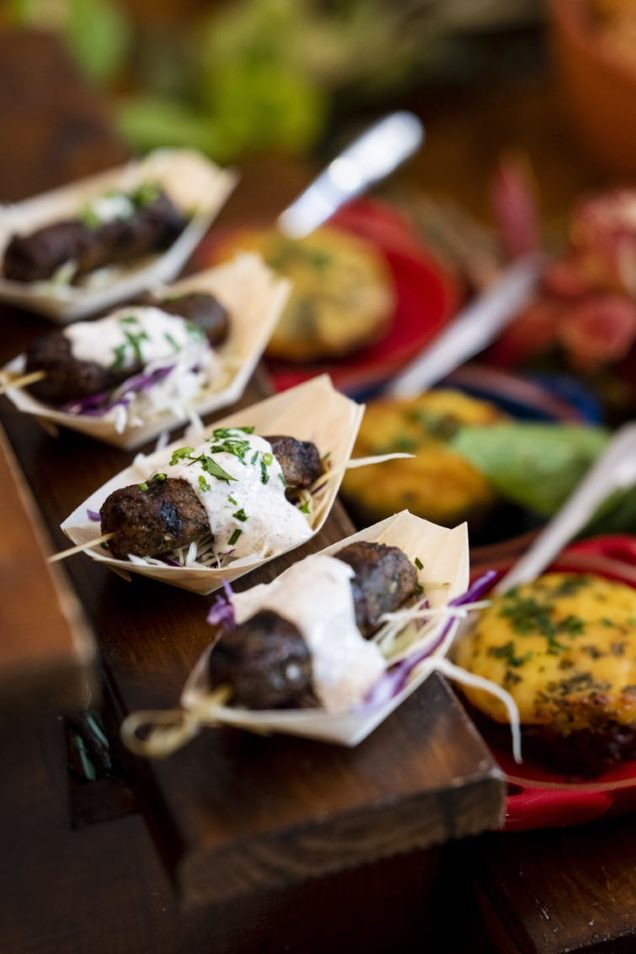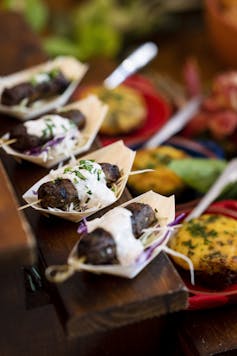Updated 21 October 2020
There is a revolution taking place in burger joints and supermarkets across Australia. Plant products that taste and behave like meat are increasingly making their way onto the plates of consumers as concern grows over the environmental impact of food production.
The CSIRO launched its plant-based meat venture, v2food. We plan to develop a range of wholly Australian meat alternatives to be sold in supermarkets and restaurants across the country. The products include protein from legumes, fibre from plants, and oils from sunflower and coconut.
Hungry Jack’s will be the first major fast food chain to stock our product. Meat-free burger patties will soon be available in their stores. Our mince will also be available in grocery stores in the near future.
The venture is a partnership between CSIRO, Main Sequence Ventures (CSIRO’s investment fund) and food retailer Competitive Foods Australia.
The alternative protein market is already worth billions of dollars in the United States. A recent CSIRO analysis of emerging food trends in Australia estimated the revenue from domestic consumption and exports of plant-based protein products could be A$6.6 billion in 2030.

Hungry Jack’s will soon offer a plant-based burger patty alongside traditional meat options. Dave Hunt/AAP
There’s a science to getting a meaty taste from plants
v2food’s plant-based meat alternatives are not solely designed for vegans. Meat-eaters are a key target, particularly those who are concerned about the impact of food production on the environment.
Building a burger out of plants that will appeal to a meat-eater is no simple task. The product not only has to have the texture of meat but also the flavour, including that chargrilled taste, and should perhaps even “bleed” like meat cooked just right on the barbecue.
It took US companies Beyond Meat and Impossible Foods several years to bring a “beef” product onto the market. CSIRO’s specialists in food texture and flavour science achieved this in eight months.

v2food’s mini hotdogs and sliders. CSIRO food scientists and nutritionists helped develop the products. Tara Pereira
Known as sculptured food, the plant-based meat alternatives we’re working on comprising different ratios of plant proteins combined with carbohydrates from varying sources.
By studying the interactions of the ingredients at a molecular level and analysing the textures resulting from different processing techniques, it has been possible to develop products with the most appropriate texture, structure and bite – from soft to fibrous to cartilaginous.
Through formulation and processing, we coaxed proteins and carbohydrates to interact in different ways to form different textures.
We have also ensured the products are nutritious by introducing components such as pre-biotic fibres for a healthy gut, omega-3 plant-based or algal oils and micronutrients that provide extra vitamins and minerals.
More sustainable than meat
Meat production’s environmental impact has been the main driving force behind the development of plant-based protein alternatives. It contributes to climate change through the greenhouse gases emitted by livestock and deforestation to create grazing land.
As we developed the product we assessed the environmental impacts of different ingredients and made the most environmentally friendly choices.
We still have a way to go in reducing v2food’s environmental profile. For example, the processing technology required to make the meat alternatives doesn’t yet exist in Australia, so we sourced a soy protein from offshore and combined this with other natural ingredients rich in carbohydrates.
Within the next year, v2food will have the equipment to process local ingredients, which will go a long way towards providing a more sustainable alternative.

Meat on display at a Woolworths supermarket in Everton Park, Brisbane. The v2food venture is catering to meat eaters concerned about the environmental impact of food production.
Dan Peled/AAP
Plant-based products we’re working on, such as the burger patty, have less fat than their meat counterparts sold in fast food chains – in particular less saturated fat. They contain similar amounts of protein and have the added bonus of fibre, which is not found in animal protein and is inadequate in the diet of most Australians.
There is still room for improvement and nutritionists and food technologists are working on ways to make v2food products healthier and more nutritious – for example, bringing down the salt content.
Animal protein sources including red meat, poultry and seafood remain important components of a healthy diet in Australia because they provide nutrients that contribute to a healthy diet, including high-quality protein, iron, zinc, vitamin B12 and healthy omega-3 fats.
In Australia, chicken and red meat comprise 70 per cent of both lean meats and their alternatives. So incorporating plant-based meat alternatives can increase the diversity of protein sources in our diet.
What does this mean for Australian agriculture?
For now, v2food is calling its product “meat made from plants”. There are calls – in Australia and abroad – to limit the use of terms such as meat, milk and seafood to animal-derived products. However, global protein demand is expected to grow to such an extent that all protein producers, whether they be cattle farmers or legume growers, will be called on to fill the gap.

Currant and mint kofta by v2food. Tara Pereira

In the US, demand for Canadian yellow peas – a main ingredient in plant-based protein products – is outstripping supply. We’re mapping out what the supply chain might look like for plant-based proteins in Australia and the opportunities for plant breeders, growers and producers. Once we have the required processing capability within Australia, this will open the door to higher value uses of legumes.
By harnessing innovation across science disciplines of food, agriculture, sustainability and nutrition, we can achieve a healthy, sustainable and locally grown and produced product.
This article is republished from The Conversation under a Creative Commons license. Read the original article.


18th October 2019 at 2:41 am
How about calling it Vemeat? I know when I buy almond milk that it is not animal milk, the package doesn’t try to fool people: that is the important point. But meat requires more resources in its production than vegetable matter! The best way is via microbiology as ICI showed years ago in developing Quorn.
17th October 2019 at 4:40 pm
It is a good idea, however I agree with other comments that it should not be called meat, it is not meat. It is obviously a product for omnivores, as vegetarians and vegans don’t usually need to have meat-tasting foods, we can live quite happily on plant-based food and don’t need to have things artificially taste like meat. But if the omni’s feel it gives them a little less meat in their diet – go for it. I do hope it doesn’t contain too many (or any) artificial flavours or preservatives though.
17th October 2019 at 12:53 pm
It’s not meat. It is a grow from a plant, which is fine, just don’t say it’s meat, when it is not. Same as almond milk, it is not milk, milk comes from a mammal, not a plant. It is almond water. Truth in advertising. Truth in labelling.
16th October 2019 at 1:25 pm
This looks fantastic, but what’s the macronutrient ratio? People on a low carb lifestyle tend to consume larger quantities of meat, and although a meat alternative would be fantastic, it seems there is might be a high carb content?
16th October 2019 at 11:09 am
This must be labelled non meat and” made from plants and oils” ,Do not call this product” meat.”That is a lie .It is definitely” Not meat.”.Nor can it “taste like meat ” as only actual MEAT can taste like MEAT.Australia has labelling standards USE THEM….This is VEGAN based food advertise it as such….I hope those who eat this plant based meal enjoy it .A Great Alternative Meal ,for those who don’t eat Meat .